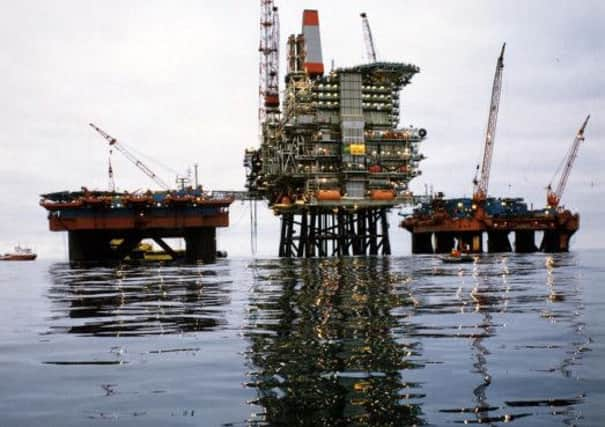Leaders: North Sea oil more blessing than curse


This year, with the referendum now just six months away, the debate is understandably louder than usual. But is it any more illuminating?
Adding spice to this year’s numbers is the fact that Scotland’s oil and gas revenues have taken a hit. Naturally, this has been leapt upon by the Better Together campaign and presented as evidence of what a perilous place an independent Scotland would be.
Advertisement
Hide AdAdvertisement
Hide AdSome of the No camp’s claims are sound. The income of a sovereign Scotland would indeed fluctuate greatly – in some cases wildly – depending on the state of the oil industry. In the 12 months covered by the latest Gers statistics, it means an independent Scotland’s deficit as a share of GDP would have been 8.3 per cent – fully 1 per cent higher than the UK figure of 7.3 per cent.
The No camp is also justified in pointing to the added volatility caused by the ageing infrastructure of the North Sea oil and gas industry. Part of the reason for the fall in oil and gas revenues in the past year was the unplanned shutdown of the Elgin field. Such problems might increase as the rigs and the pipelines age.
All these factors are undeniable. The pertinent question is whether they are convincing arguments against the economics of Scottish independence. By this measure, the evidence is less than compelling.
Oil price volatility is a recognised fact of life in petro-nations worldwide, and somehow they find a way of coping. Of course, doing so requires deftness and financial planning. It requires political leaders to spend well within their capabilities within any given year in the sure and certain knowledge that the amount they have to play with could be substantially less in a year or so. It would, in fact, require a completely different style of economic management than the one we have become used to within the United Kingdom. But to present an oil-rich Scotland as some kind of casino economy is to stretch credulity.
Let us be clear. Oil is a diminishing resource. It will not last forever. Having it as the bedrock of the economy could pose significant challenges in financial management. And an independent Scotland would have to plan for the day the oil stopped coming ashore in any meaningful quantity, perhaps 40 years from now.
But in the meantime, as problems go, they don’t come much better than being unclear as to how many billions of pounds this year’s natural resources windfall will be worth.
North Sea oil is more of a blessing than a curse. The question we face is whether Scotland shares those benefits and challenges with the rest of the UK, or deals with them alone.
High hopes for Glasgow 2014
The Glasgow 2014 Commonwealth Games are almost upon us. Just how tantalisingly close was demonstrated yesterday with the unveiling of the upgraded Hampden Park, newly transformed into an athletics stadium. The thought of those stands packed full of people cheering on some of the world’s top sporting talent is one to savour.
Advertisement
Hide AdAdvertisement
Hide AdIn the great Scottish engineering tradition, the new running track is an innovation. It rests on 6,000 specially constructed stilts, and this will be the first time such technology has been authorised by the governing body of athletics for such a major tournament.
Organisers hope it will be a “fast track”, not just because of its world-class surface but because of the close proximity runners will have to the crowd, compared with other big athletics stadiums worldwide.
The hope is that this proximity to the crowd will give races an added edge of drama and competitiveness, with the result being seen in titanic contests and broken records.
Which brings us to Glasgow 2014’s secret ingredient – the spectators. For much of the long build-up to the Games, the city of Glasgow and Scotland at large have looked on in interest. But it is only now, with just weeks to go, that the full sense of the occasion is beginning to become clear.
The Games will be many things to Scotland, depending on one’s point of view: an economic boost for Glasgow’s East End; a patriotic celebration of modern Scotland; a shot in the arm for the tourist industry.
But it will also be a chance for Glaswegians and other Scots to number themselves among the stars of the occasion, and not just the audience.